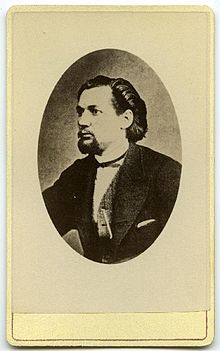Aleksander Saebelmann-Kunileid
Aleksander Saebelmann-Kunileid (born November 22, 1845 in Audru , Estonia , † July 27, 1875 in Poltava , Ukraine ) was an Estonian composer. He is considered to be one of the founders of Estonian choral music .
life and work
Aleksander Peeter Karl Saebelmann (also Säbelmann) was born in the Pärnu district as the son of a teacher. As with his brother Friedrich August Saebelmann , a musical talent showed up early on. He received his first musical training from his father, who played the organ and piano . As a 16-year-old, Aleksander Saebelmann attended Jānis Cimze's renowned teacher seminar in Valga (German Walk ), which he completed in 1865.
Then Aleksander Saebelmann worked as a teacher in Paistu for three years . There he often played the organ of the local church. He made friends with the leading figures of the time of the Estonian national awakening: Carl Robert Jakobson , Johann Voldemar Jannsen and his daughter Lydia Koidula . In 1868 the seminar of Valga appointed Kunileid as assistant teacher. He dropped his German-sounding name in favor of the self-chosen Estonian name Kunileid. It should go back to Jakobsons otsi, kuni leiad (“search until you find”).
At Jakobson's instigation, Kunileid played a leading role at the first Estonian Song Festival in 1869. During this time, Kunileid composed numerous songs for choir such as Mu isamaa on minu arm , Sind surmani and Mu isamaa, nad olid matnud , which are now part of the classic Estonian canon of nationally- minded songs.
Jakobson also included Kunileid's works in his famous collection of Estonian songs Wanemuine Kandle Healed (first volume 1869, second volume 1871). At the Estonian Song Festival in 1869, Kunileid acted alongside Jannsen as the main organizer and chairman of the jury for choral singing.
In 1871 Kunileid moved to Saint Petersburg with his younger brother Friedrich Saebelmann, who had also completed the teachers' seminar in Volga . Initially both had to live in very simple circumstances. In Gatchina near the Russian capital, Aleksander Kunileid became a teacher at the Estonian school and later at the Kolppana seminary . In 1873 Kunileid's health deteriorated noticeably. Because of the better climate, he became a teacher and organist in Poltava that same year . He died there in the summer of 1875. He was buried in the Poltava City Cemetery, which was leveled after the Second World War .
Settings (selection)
- "Arg kosilane" (Text: Friedrich Reinhold Kreutzwald )
- "Caste yes pisarad" (Carl Robert Jakobson)
- "Meil aiaäärne tänavas" (Lydia Koidula)
- "Miks sa nutad, lilleke?" (Lydia Koidula)
- "Mu mõttes on üks ainuke" (folk poetry)
- "Põua aastal 1868" (Carl Robert Jakobson)
- "Süda tuksub" (folk poetry)
- "Ema ja laps" (Carl Robert Jakobson)
- " Mu isamaa on minu arm " (Lydia Koidula)
- "Mu isamaa, nad olid matnud" (Lydia Koidula)
- "Are surmani" (Lydia Koidula)
- "Veel pole kadunud kõik" (Carl Robert Jakobson)
- "Õitse ja haljenda, eestlaste maa" (Lydia Koidula)
- "Süda tuksub" (folk poetry)
- "Mu mõttes on üksainuke" (folk poetry)
Web links
- Short biography ( memento from October 9, 2007 in the Internet Archive )
- CV, works, pictures (Estonian)
Individual evidence
- ↑ Heliloojad => Aleksander Saebelmann-Kunileid ( Memento from June 20, 2012 in the Internet Archive )
| personal data | |
|---|---|
| SURNAME | Saebelmann-Kunileid, Aleksander |
| ALTERNATIVE NAMES | Kunileid, Aleksander |
| BRIEF DESCRIPTION | Estonian composer |
| DATE OF BIRTH | November 22, 1845 |
| PLACE OF BIRTH | Audru , Parnu County , Estonia |
| DATE OF DEATH | July 27, 1875 |
| Place of death | Poltava , Ukraine |
